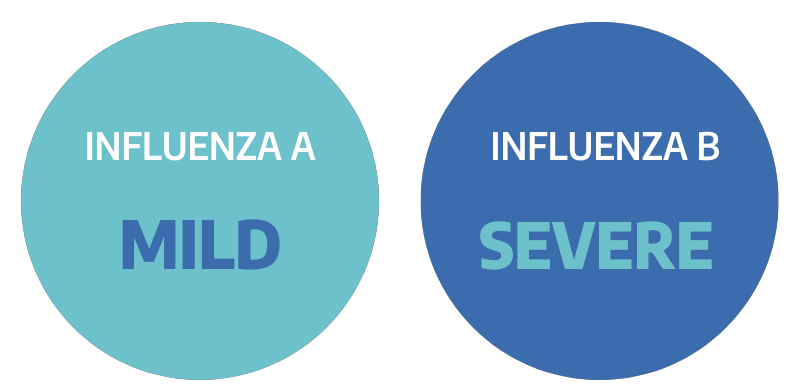According to the CDC, there have been nearly 80,000 hospitalizations and 8.7 million illnesses due to the flu this season.
Many states recorded high or very high flu activity levels at the end of November. As winter progresses, cases continue to soar throughout the United States.

https://www.cdc.gov/flu/weekly/index.htm
Influenza is a viral infection that spreads quickly. Contagious a day before showing symptoms, it can be difficult to protect yourself against the flu.
So, what should you look out for this flu season?
Read this article to learn more about flu symptoms, prevention, and treatment.
Flu Symptoms
What is the Flu?
Influenza, commonly referred to as the flu, is a viral infection that is highly contagious and attacks the nose, throat, and lungs.
There are three types of influenza in humans: A, B, and C.
- Influenza A: mild, can spread from animals to humans.
- Influenza B: severe, only contagious between humans.
- Influenza C: most mild, does not cause serious illness or epidemics.
Influenza A and B are the most common and known to cause a seasonal epidemic, specifically in the cold months. Flu season can last from October until May, peaking in December and February.

How Does the Flu Spread?
As a highly contagious infection, the flu quickly spreads from person to person. Influenza is mainly passed on through droplets in the air from talking, coughing, or sneezing within six feet of others. You can also get sick by touching your face after touching an infected object or surface.
Now that you know how the flu spreads, how do you know if you have the flu?

What are Flu Symptoms?
If you have influenza, you may experience:
- Chills
- Stuffy or runny nose
- Sore throat
- Tiredness
- Cough
- Body aches
- Fever
Unlike COVID-19, flu symptoms develop quickly rather than gradually.
What are the Differences Between COVID-19 and the Flu?
When assessing your symptoms, it may be difficult to tell whether you have COVID-19 or the flu. The two share similar symptoms, but the main difference between COVID-19 and the flu is the duration. Flu symptoms last four to seven days, whereas COVID-19 symptoms can last for weeks or months. Although possible, you are less likely to lose your sense of smell or taste when you have influenza.
Do you think you might have the flu? Go to the doctor to receive a test today!

How Do You Receive a Diagnosis?
A healthcare provider will test for influenza by swabbing your throat or the inside of your nose. There are two ways to receive a flu diagnosis: a rapid influenza diagnostic test (RIDT) or a rapid molecular assay.
An RIDT detects antigens (toxins, foreign substances) that prompt a response from the immune system. This test takes about 10-15 minutes. However, an RIDT is not as accurate as a rapid molecular assay.
Take a rapid molecular assay to ensure your flu test is as accurate as possible. These tests detect genetic material from the flu virus. You will have your result after 15-20 minutes.
Help protect those around you by getting tested for influenza.

Who is at Risk?
Although influenza is a common illness, it can be deadly for those at high risk.
People who are at high risk from the flu include:
- Those with preexisting medical conditions
- Infants
- Children younger than five years old
- Pregnant women
- Adults 65 years or older
If you or a loved one falls under this category, it is important to look at ways to prevent the flu in your household.
Flu Prevention
Sometimes getting the flu is inevitable. However, you can naturally boost your immune system and protect yourself from illness.
Boost Your Immune System
Sleep 7 to 8 Hours
Our always-busy society overlooks the importance of adequate sleep. The CDC reports that over 35% of adults sleep less than seven hours a night.

So, what happens when you are sleep deprived?
When you don’t get enough sleep, your immune system suffers the consequences. Sleep allows your immune system to release proteins called cytokines. A lack of sleep causes a decrease in cytokines and leaves your body vulnerable to fighting off illness.

To boost your immune system, get into a routine of sleeping seven to eight hours every night. This rest will allow your body time to heal, rejuvenate, and protect itself from viruses.
Eat and Drink Nutritiously
The food and drinks you put into your body directly impact your immune system. Avoid drinking alcohol and consuming foods high in sugar, cholesterol, and saturated fats. Instead, opt for foods that contain nutrients and minerals, such as:
- Nuts and seeds
- Berries
- Yogurt
- Chicken
- Fish Oil

If you feel you aren’t receiving the proper nutrients from your diet, consider supplementing with Vitamins B6, C, and E to boost your immunity.
Drinking the right amount of water each day can also have shocking benefits. Not only does water eliminate toxins from the body, but it also enhances your energy levels.
Being dehydrated exposes your body to illness and fatigue. To maintain high energy levels, drink more water and consider exercising throughout the day.
Exercise Daily
Strengthen your antibodies by exercising daily!
Physical activity increases the flow of immune cells throughout the body. Exercise allows your immune system to recognize viruses quicker and react appropriately.

Get in the routine of exercising for thirty minutes every single day to boost your immunity!
Along with sleep, nutrition, and exercise, practice preventative measures to decrease your risk of flu exposure.
Reduce Exposure
Stay safe this flu season by being conscientious of yourself and those around you.
Here are some tips to help you prevent catching the flu:
- Wash your hands frequently.
- Avoid touching your face.
- Keep your distance.
If you are sick, do your part to protect others by:
- Staying home.
- Covering your sneezes and coughs.
- Sanitizing surfaces.

You alone can only do so much to stop the spread. Consider receiving the flu vaccination today to prevent yourself and others from contracting the flu.
Flu Vaccination
The flu vaccination, or the flu shot, is typically given by needle and protects against the most common influenza viruses. Everyone over the age of six months can receive the flu shot.
Based on a CDC study, around 50% of adults in the U.S. received the flu shot for the 2021-2022 season.

Different versions of the flu shot are available depending on your age, allergies, and overall health.
What Flu Shot Should I Get?
Here are three of the available flu shots for the 2022-2023 year:
Standard Dose Shot
- Egg-based: Yes.
- Age: 6 months and older.
High Dose Shot
- Egg-based: Yes.
- Age: 65 and older.
- Antigens: 4x.
- Strong immunity.
Recombinant Shot
- Egg-based: No.
- Age: 18 years and older.
- Antigens: 3x.
- Strong immunity.
Consult your doctor to decide which vaccine you should receive.


What are the Benefits of the Flu Vaccine?
Receive the influenza vaccination to:
- Avoid getting sick.
- Reduce the severity of flu symptoms.
- Decrease the chance of hospitalization.
- Protect others.
The flu vaccine is proven to decrease the chance of visiting the doctor for severe symptoms by 40% to 60%. If you decide to go to the doctor, there are a variety of treatments you can take.
Flu Treatment
Antiviral Drugs
Influenza is a treatable illness. Healthcare providers prescribe antiviral drugs to treat the flu by reducing fever and symptoms. If you are at risk of a complication, begin medication immediately to decrease severe symptoms.
The FDA has approved four flu antiviral drugs this season. Consult your doctor to decide which prescription works best for you and your situation.

Natural Remedies
If you would like to relieve your symptoms naturally, try some of these at-home remedies for the flu:
Consume Honey
Soothe your throat with honey! Honey contains antioxidants and boosts your immune system. Relieve your system with honey’s antimicrobial and antibacterial properties!
Take a Hot Shower
Decongest with a hot shower! Steam from a shower allows you to breathe easier by clearing nasal passages and easing congestion in the chest.
Gargle Salt Water
Kill harmful bacteria with warm salt water! Gargle a mixture of warm water and salt to ease throat pain and mucus. You may have a complication if your medication or natural remedies aren’t working to relieve your flu symptoms.

Flu Complications
Life-threatening conditions can develop because of the flu. Although most people recover quickly in a week or two, others struggle with flu complications. Some common influenza complications to look out for include:
- Inflammation of muscle, brain, or heart tissues
- Ear infections
- Organ failure
- Sepsis
Seek medical attention if you experience any of the following symptoms:
- Seizures
- Weakness or unsteadiness
- Consistent chest or abdominal pain
- Shortness of breath
- Severe muscle pain
- Not urinating
- Inconsistent fevers
The flu is a highly contagious illness that may turn life-threatening.

Protect yourself this flu season by getting a good night’s sleep, eating and drinking right, exercising daily, and receiving the flu vaccination. Follow preventative measures such as washing your hands and keeping your distance if you or someone you know gets sick with influenza.
Try a natural remedy if you get sick or receive an antiviral prescription from the doctor. If you experience any flu complications or your symptoms worsen, seek medical attention immediately.
Don’t hesitate to reach out to us at https://www.cnascientific.com/contact/ with any questions or concerns regarding the flu this season.
C & A Scientific is a dedicated leader in improving the health and minds of people worldwide. We supply over 700 award-winning medical and STEM-inspired products to distributors and retailers looking for sensational customer service. Learn more about us and our story here.

